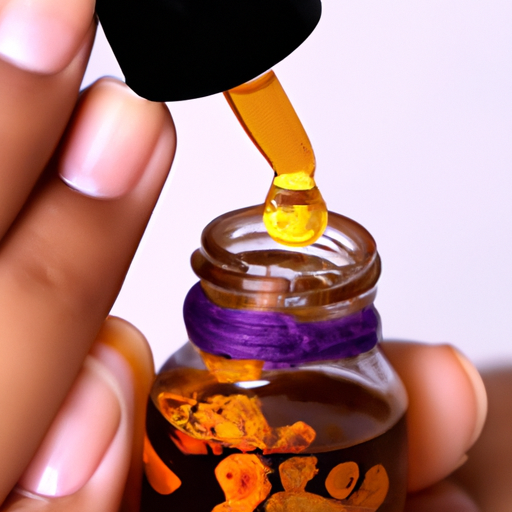As a new mom, I am continuously educating myself on the most effective methods to care for my baby’s health and overall well-being. A recent topic of interest has been the use of turmeric and its potential effects on breast milk production.
While turmeric has been touted for its many health benefits, including anti-inflammatory and antioxidant properties, it is important to understand the science behind breast milk production and the current research on the effects of turmeric.
Breast milk is the primary source of nutrition for infants and is crucial for their growth and development. The process of milk production is complex and regulated by hormones, including prolactin and oxytocin.
As a result, any substance that may interfere with these hormones could potentially impact breast milk production. This is why I am interested in learning more about the potential effects of turmeric on breast milk production and if there are any natural remedies that can safely increase milk supply.
Key Takeaways
- Fenugreek, fennel, and blessed thistle are effective herbs for increasing breast milk production.
- Fenugreek supplements can increase milk production by up to 40%, with a recommended dosage of around 3500mg per day.
- Fennel stimulates the production of estrogen, a key hormone in lactation, and also has anti-inflammatory and antioxidant properties.
- Blessed thistle stimulates the pituitary gland to release prolactin, the hormone responsible for milk production, and also has anti-inflammatory and antibacterial properties.
However, there is not enough research to determine the effects of turmeric on breast milk production or its safety during breastfeeding. It is important to consult with a healthcare provider before taking any herbal supplement and prioritize both own health and baby’s health.
Understanding the Benefits and Risks of Turmeric
You’ll want to understand the benefits and risks of turmeric before deciding if it’s right for you, especially if you’re a breastfeeding mother looking to increase your milk supply.
Turmeric supplements have been used for centuries as a natural remedy for a variety of ailments, and recent research has shown that it may have anti-inflammatory and antioxidant properties. However, there is limited scientific evidence to support the use of turmeric for milk production, and it’s important to consult with a healthcare provider before using it.
Dosage recommendations for breastfeeding mothers who want to use turmeric for milk production are not well-established. Some sources suggest taking 500-2,000 mg of turmeric per day, while others recommend using it in cooking or drinking turmeric tea instead of taking supplements.
Safety considerations when using turmeric for milk production include potential side effects such as upset stomach, diarrhea, and allergic reactions. It’s also important to note that turmeric may interact with certain medications, so it’s important to discuss its use with a healthcare provider.
With that in mind, let’s take a closer look at the science behind breast milk production.
The Science Behind Breast Milk Production
Breastfeeding is a natural process that’s initiated by hormonal changes in a woman’s body during pregnancy. The production of breast milk is regulated by lactation hormones, mainly prolactin and oxytocin. These hormones work together to stimulate the mammary glands to produce and release milk for the baby to feed on.
However, breastfeeding challenges such as insufficient milk supply can arise due to various factors such as poor nutrition, stress, and certain medications. To address these challenges, some women turn to natural remedies such as turmeric to increase their milk supply.
While there’s no scientific evidence to support the use of turmeric for this purpose, understanding the science behind breast milk production can help us appreciate the complexities involved in lactation. In the subsequent section, we’ll explore current research on turmeric and breast milk production.
Current Research on Turmeric and Breast Milk Production
As I delved into the current research on turmeric and breast milk production, I found studies that suggest a potential increase in milk supply. However, there are also studies that show no significant effect on milk supply.
Despite these conflicting results, it’s important to acknowledge the limitations and inconsistencies in the research before making any conclusions.
Studies that suggest a potential increase in milk supply
There’s evidence that turmeric can help boost milk production, giving nursing mothers more milk to nourish their little ones. Some studies suggest that the active ingredient in turmeric, curcumin, may stimulate the production of prolactin, the hormone responsible for milk production. However, it’s important to note that there are potential drawbacks to using turmeric for this purpose.
Optimal dosage hasn’t been established, and excessive use of turmeric can lead to digestive issues and liver damage. Furthermore, long-term use of turmeric may have an effect on the baby’s health, as the spice can pass through breast milk and potentially cause allergic reactions or interfere with medication. While turmeric may have a positive impact on milk supply, it’s important for nursing mothers to consult with their healthcare provider before incorporating it into their diet.
Moving forward, it’s important to consider studies that show no significant effect on milk supply. While some research suggests a potential increase in milk production with the use of turmeric, other studies have found no significant difference in milk supply between mothers who consumed turmeric and those who didn’t. It’s important to weigh the potential benefits and drawbacks before using turmeric as a way to boost milk production, and to always consult with a healthcare provider for personalized guidance.
Studies that show no significant effect on milk supply
If you’re considering using turmeric as an alternate remedy to increase your milk supply, it’s important to be aware of studies that have found no significant effect on milk production. While some studies have suggested that turmeric may increase milk supply, others have found no conclusive evidence to support this claim.
In fact, one study in particular found that turmeric had no effect on milk production in lactating rats. It’s also important to note that turmeric may have potential side effects, such as gastrointestinal upset, allergic reactions, and interactions with certain medications. Therefore, it’s recommended that lactating women consult with their healthcare provider before using turmeric or any other herbal supplement to increase milk supply.
Despite the mixed results in the research, it’s clear that more studies are needed to fully understand the potential benefits and risks of using turmeric for lactation. Furthermore, limitations and inconsistencies in the research make it difficult to draw definitive conclusions about the effectiveness of turmeric for increasing milk supply.
For example, some studies have used different doses and forms of turmeric, making it hard to compare results. Additionally, many studies have been conducted on animals or in vitro, and more research is needed to determine if the same effects would occur in humans. Despite these challenges, continued research into the potential benefits and risks of turmeric for lactation is important for helping lactating women make informed decisions about their health.
Limitations and inconsistencies in the research
Hey, you know how research can be a bit wonky sometimes, right? Well, when it comes to studying the effects of turmeric on lactation, there are a lot of limitations and inconsistencies that make it hard to draw any definitive conclusions. Here are some of the major challenges researchers face when trying to investigate this topic:
-
Limitations in study design: Many of the studies that have been conducted on turmeric and lactation suffer from design flaws that can limit the validity and generalizability of the findings. For example, some studies have relied on self-reported data from mothers, which can be subject to bias and inaccuracies. Others have used animal models, which may not accurately reflect human physiology and behavior.
-
Inconsistencies in data analysis: Even when studies are well-designed, there can be inconsistencies in the way that data is collected, analyzed, and reported. For example, some studies may use different dosages or formulations of turmeric, making it difficult to compare results across studies. Additionally, some studies may use different measures of milk production, such as volume or fat content, which can make it hard to compare results.
-
Small sample sizes: Finally, many studies on turmeric and lactation have been conducted with relatively small sample sizes, which can limit the statistical power and generalizability of the findings. This is particularly true for studies that focus on specific subpopulations, such as women with low milk supply or those who are exclusively breastfeeding.
Given these limitations and inconsistencies, it’s difficult to draw any strong conclusions about the effects of turmeric on lactation. However, there are other natural remedies that may be effective for increasing milk production, which we’ll explore in the next section.
Other Natural Remedies for Breast Milk Production
As a nursing mother, I’ve been researching natural ways to increase breast milk production. Three popular remedies that have been studied for their potential lactogenic effects are fenugreek, fennel, and blessed thistle.
Research suggests that these herbs may help stimulate milk production, but it’s important to consult with a healthcare provider before trying any natural remedies.
Fenugreek
Fenugreek, a popular herb used to increase milk supply, has been found to be effective in many studies. Its benefits for mothers who want to increase their breast milk production are well-known and documented.
Fenugreek contains phytoestrogens that mimic the effects of estrogen, a hormone that plays a crucial role in milk production. It also contains galactagogues, substances that stimulate milk production in the mammary glands.
Studies have shown that taking fenugreek supplements can increase milk production by up to 40%. It’s recommended to take the supplement in capsule form, as it’s easier to control the dosage. The optimal dosage is usually around 3500mg per day, taken in divided doses. However, it’s important to consult with a healthcare provider before taking any supplements.
Moving on to the next natural remedy for breast milk production, fennel has also been found to be effective in increasing milk supply.
Fennel
If you’re looking to add another tool to your milk supply arsenal, fennel might just be the cherry on top. Fennel has been used for centuries as a natural remedy for digestive problems and to boost milk production in nursing mothers. It contains compounds such as anethole, which is believed to stimulate the production of estrogen, a hormone that plays a key role in lactation.
Apart from its ability to increase milk production, fennel also has other health benefits. It’s been shown to have anti-inflammatory and antioxidant properties, which may help reduce the risk of chronic diseases such as heart disease and cancer. However, like any other herb or supplement, fennel may also have side effects such as allergic reactions, gastrointestinal problems, and interactions with certain medications. Therefore, it’s important to talk to your healthcare provider before incorporating fennel into your breastfeeding routine.
Moving on to the next subtopic, blessed thistle is another herb that’s been traditionally used to increase milk production.
Blessed thistle
Blessed thistle, with its long history of use as a galactagogue, is a herb that nursing mothers might want to consider adding to their breastfeeding routine. Studies have shown that blessed thistle can increase breast milk production by stimulating the pituitary gland to release prolactin, the hormone responsible for milk production.
Additionally, blessed thistle has anti-inflammatory and antibacterial properties, which can help prevent infection and reduce inflammation in the breast tissue.
The recommended dosage for blessed thistle is typically 1-3 capsules of 390 mg per day, taken with a meal. However, it’s important to note that the effects of blessed thistle on breast milk production may vary from person to person, and it’s always best to consult with a healthcare provider before taking any herbal supplement. They can help determine the appropriate dosage and ensure that it doesn’t interact with any medications or medical conditions.
Consultation with a Healthcare Provider
Before taking any supplements or drastically changing your diet, it’s important to consult with your healthcare provider to determine if it’s safe for you and your baby.
While turmeric has potential health benefits, including reducing inflammation and fighting cancer, there isn’t enough research to determine its effects on breast milk production or its safety during breastfeeding.
Your healthcare provider can provide personalized advice based on your medical history and current health status. They can also help identify any potential risks or concerns associated with taking turmeric or any other supplements while breastfeeding.
It’s important to prioritize both your own health and the health of your baby. Consulting with a healthcare provider can help ensure that you make informed decisions about your diet and supplement use.
Frequently Asked Questions
How long does it take for turmeric to start affecting breast milk production?
As a breastfeeding mother, I have found that incorporating natural milk boosters like turmeric into my diet can take a few days to start affecting breast milk production. Breastfeeding benefits from natural remedies should always be discussed with a healthcare provider for optimal results.
Can turmeric be harmful to the baby if consumed through breast milk?
Breast milk safety is a top priority for any breastfeeding mother. While turmeric consumption is generally safe for adults, its impact on breast milk is not well studied. It is important to consult with a healthcare provider before consuming turmeric while breastfeeding.
Are there any side effects of consuming turmeric while breastfeeding?
I researched turmeric and lactation and found no evidence of harmful side effects for nursing mothers and their babies. In fact, a study showed that turmeric may increase milk production by 50%. It’s important to consult with your healthcare provider and use turmeric in moderation.
Can turmeric supplements be used alongside prescription medication for milk production?
Combining supplements and prescription medication for milk production should be done with caution and under the guidance of a healthcare provider. Turmeric may be an alternative option to explore, but managing dosage is important.
Is turmeric safe for pregnant women who are preparing for breastfeeding?
During pregnancy, turmeric consumption may have benefits such as reducing inflammation and improving digestion. However, it may also increase the risk of miscarriage and bleeding. Turmeric as a natural remedy for breastfeeding problems requires further research.
Conclusion
After researching the topic and speaking with my healthcare provider, I feel confident in saying that turmeric doesn’t reduce breast milk production. In fact, some studies suggest that turmeric may even have a positive effect on lactation.
However, as with any supplement or medication, it’s important to consult with a healthcare provider before adding turmeric to your diet.
Just like a puzzle, breastfeeding can be a complex and sometimes challenging experience. There are many pieces that need to come together in order for it to work properly.
While turmeric may not be the missing piece for everyone, it’s worth exploring natural remedies for lactation issues. With the guidance of a healthcare provider, adding turmeric to your diet may be just what you need to complete the puzzle and achieve successful breastfeeding.










